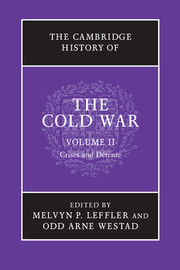Book contents
- Frontmatter
- 1 Grand strategies in the Cold War
- 2 Identity and the Cold War
- 3 Economic aspects of the Cold War, 1962–1975
- 4 The Cuban missile crisis
- 5 Nuclear competition in an era of stalemate, 1963–1975
- 6 US foreign policy from Kennedy to Johnson
- 7 Soviet foreign policy, 1962–1975
- 8 France, “Gaullism,” and the Cold War
- 9 European integration and the Cold War
- 10 Détente in Europe, 1962–1975
- 11 Eastern Europe: Stalinism to Solidarity
- 12 The Cold War and the transformation of the Mediterranean, 1960–1975
- 13 The Cold War in the Third World, 1963–1975
- 14 The Indochina wars and the Cold War, 1945–1975
- 15 The Cold War in the Middle East: Suez crisis to Camp David Accords
- 16 Cuba and the Cold War, 1959–1980
- 17 The Sino-Soviet split
- 18 Détente in the Nixon–Ford years, 1969–1976
- 19 Nuclear proliferation and non-proliferation during the Cold War
- 20 Intelligence in the Cold War
- 21 Reading, viewing, and tuning in to the Cold War
- 22 Counter-cultures: the rebellions against the Cold War order, 1965–1975
- 23 The structure of great power politics, 1963–1975
- 24 The Cold War and the social and economic history of the twentieth century
- Bibliographical essay
- Index
- References
10 - Détente in Europe, 1962–1975
Published online by Cambridge University Press: 28 September 2010
- Frontmatter
- 1 Grand strategies in the Cold War
- 2 Identity and the Cold War
- 3 Economic aspects of the Cold War, 1962–1975
- 4 The Cuban missile crisis
- 5 Nuclear competition in an era of stalemate, 1963–1975
- 6 US foreign policy from Kennedy to Johnson
- 7 Soviet foreign policy, 1962–1975
- 8 France, “Gaullism,” and the Cold War
- 9 European integration and the Cold War
- 10 Détente in Europe, 1962–1975
- 11 Eastern Europe: Stalinism to Solidarity
- 12 The Cold War and the transformation of the Mediterranean, 1960–1975
- 13 The Cold War in the Third World, 1963–1975
- 14 The Indochina wars and the Cold War, 1945–1975
- 15 The Cold War in the Middle East: Suez crisis to Camp David Accords
- 16 Cuba and the Cold War, 1959–1980
- 17 The Sino-Soviet split
- 18 Détente in the Nixon–Ford years, 1969–1976
- 19 Nuclear proliferation and non-proliferation during the Cold War
- 20 Intelligence in the Cold War
- 21 Reading, viewing, and tuning in to the Cold War
- 22 Counter-cultures: the rebellions against the Cold War order, 1965–1975
- 23 The structure of great power politics, 1963–1975
- 24 The Cold War and the social and economic history of the twentieth century
- Bibliographical essay
- Index
- References
Summary
The main purpose of this chapter is to argue that European détente was, first and foremost, a European project. While there is no denying the significance of the United States and the Soviet Union in the shaping of Europe’s fortunes in the 1960s and 1970s, détente actually began (and continued far longer) in Europe. In some ways this should be no surprise to any student of the Cold War: after all, the Cold War had commenced to a large extent in the Old World and would, in the late 1980s, wither away there as well. So, why should the “middle cold war” have been any different? In fact, one can push the argument slightly further: while the division of Germany lay at the heart of the Cold War division of Europe and the unification of that country marked the end of that era, then something profound took place in the status of Germany as a result of the Ostpolitik practiced, in particular, by West German chancellor Willy Brandt (1969–74). It was ultimately his policy of multiple “openings” – most significantly to the USSR, Poland, and East Germany – that ushered in an era of détente in Europe.
More precisely, the basic argument in this chapter is that the relaxation of East–West tensions in Europe was a result of a European challenge to the excesses of bipolarity. Some of these challenges came in the form of nationalistic needs – be it Charles de Gaulle’s effort to lift France’s international status or, most significantly, Willy Brandt’s pursuit of Ostpolitik. There was, as Henry Kissinger observed, no obvious unity among Europeans beyond their general resentment of being treated as pawns by the United States and the Soviet Union in a game of global geopolitics. Yet, as such agreements as the Harmel Report of 1967 and the Davignon Report of 1970 would indicate, most Europeans agreed with each other on the general need for improved East–West relations and better interallied cooperation. The most evident culmination of the new era in European politics during the period discussed in this volume was the conclusion of the Conference on Security and Cooperation in Europe (CSCE) in 1975. It was there that Europe’s postwar erafinally came to an end.
- Type
- Chapter
- Information
- The Cambridge History of the Cold War , pp. 198 - 218Publisher: Cambridge University PressPrint publication year: 2010
References
- 12
- Cited by

